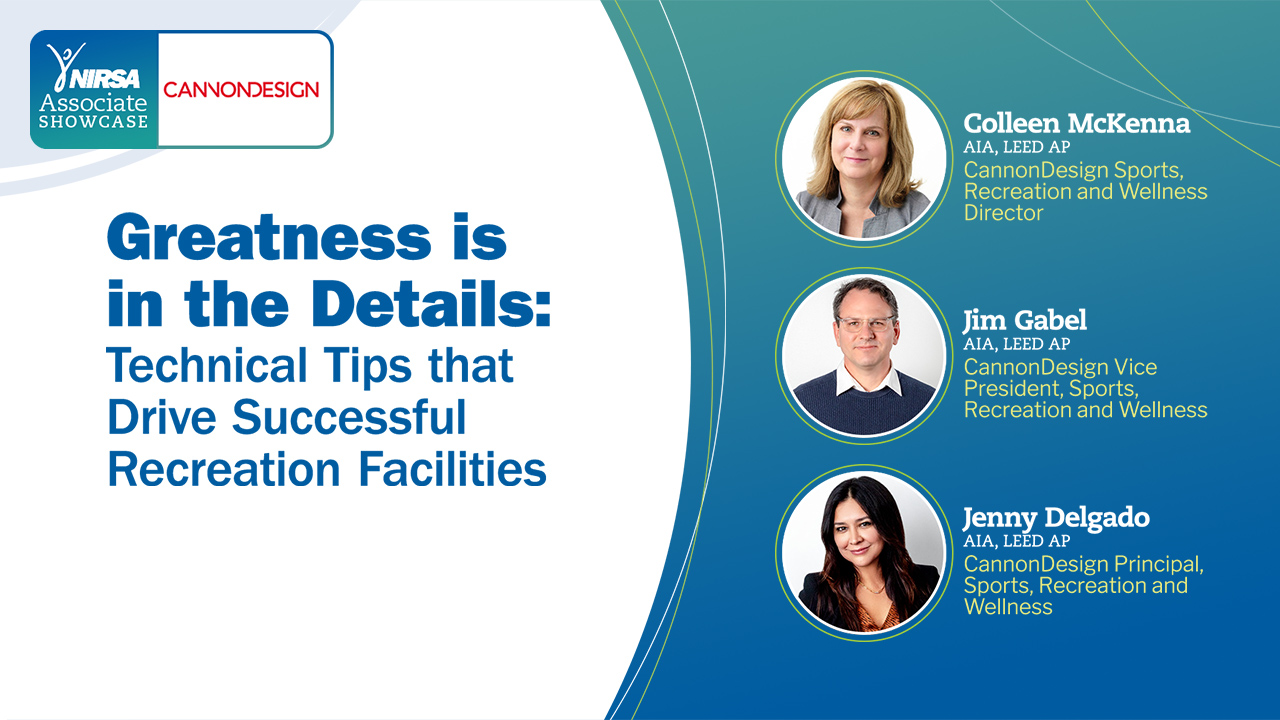Campus recreation is in an exciting and challenging transition as the needs of our students have become increasingly complex, diverse, and demanding. Student mental health and overall wellbeing are on the minds of university leaders across North America.
Largely, I think, our students need help navigating life in a way that prioritizes personal health, resiliency, and wellbeing. While responsive and reactive care will always be necessary, I believe we—the campus recreation professionals and university educators across North America—must increase our efforts regarding prevention. Campus recreation has a unique opportunity to be an integral part of a proactive approach to student wellbeing.
My lens on leadership is tinted by my background as a health coach and exercise professional. Principles of population health and behavior change guide the way I look at facility and staff management, programming, and business. As the Executive Director of Wellness and Recreation Services (WRS) at the University of Colorado Denver, I am particularly encouraged by this paradigm shift taking place in the profession. I’ve seen it happening in my own backyard. This past summer, CU Denver opened a new, wellness-focused facility.
Wellness matters
At WRS, our tagline is “Wellness Matters.” We arrived at this slogan because it now seems as though higher education is beginning to fully appreciate the importance of whole-person wellbeing. Because of this, every person on our WRS team—regardless of position—is responsible for fostering a culture that supports wellness habits. And our team aims to inspire the university community to do the same.
To that end, we issued the following Wellness Warrior Challenge:
- Lead by example (practice personal wellness habits).
- Inspire your circle of influence (support family, friends, and colleagues to practice wellness habits).
- Engage the unengaged (start conversations with students and colleagues on campus, step into discomfort, and welcome others to wellness—especially those who are not well).
Where the first two actions might be relatively straightforward, the third is our continuous challenge. In 2019, we will be launching a wellness referral program with an aim to help professional staff and faculty identify and support students in need of wellness.
Faculty and staff members will be able to refer a student to our facility—much like a physician would refer a patient to a specialty practitioner or medical fitness facility. This program is shaped after the ACSM Exercise is Medicine® model. In the first semester of the program, we have chosen to focus on gaining referrals from the counseling center, student health center, and offices within the Division of Student Development. We hope to grow the program next year to include faculty and staff throughout the university.
An ACE Certified Health Coach can help individuals create realistic plans to engage in healthy lifestyle behaviors ranging from time and stress management activities to physical exercise routines and other forms of self-care.
Enhancing individual student wellness
We consider our health coaches to be gatekeepers who can help an individual better navigate our facility and our program offerings. Our health coaches are a mix of professional staff members and graduate and undergraduate students. Students studying health-related degrees are eligible to enroll in the American Council on Exercise health coach course, which we will be offering here at CU Denver.
As we transition into 2019, our team at CU Denver’s WRS is committed to deepening intentional collaborations with the counseling center, student health center, and the offices in the Division of Student Development as our first referral sites. In the future, we also plan to engage academic counselors, faculty, and other members of the university’s professional staff.
A large part of the success of this ambitious initiative will depend on our success in engaging the university community. While we might be the deliverer of many of the services promoted by our health coaches and provided through our facility, we certainly need help identifying and connecting with the students who most need those services.
This is an example of just one program on the CU Denver campus geared at whole-student wellness. While it is driven by campus recreation, student wellbeing must be a responsibility taken on by the whole university. I am eager to watch our industry evolve to meet the changing wellbeing needs of our students.
About ACE Certified Health Coaches
ACE Certified Health Coaches—whether they are a certified health and fitness professional, a nurse, a dietician, a wellness program director or somewhere in between—have the skills necessary to facilitate healthy lifestyle changes for individuals and groups through physical activity, nutritional coaching, and behavioral change.
If you’re interested in facilitating an ACE course or in having your students become ACE Certified Health Coaches on their own, visit the ACE booth (#509) at the NIRSA Campus Rec & Wellness Expo in Boston, MA February 16 and 17.
- Learn more about NIRSA’s partnership with ACE Fitness and available NIRSA member discounts on the ACE Fitness website.
Amber Long, M.Ed., is currently the Executive Director of University of Colorado Denver Wellness & Recreation and an ACE Certified Health Coach & Personal Trainer; you can reach her at amber.j.long@ucdenver.edu.







